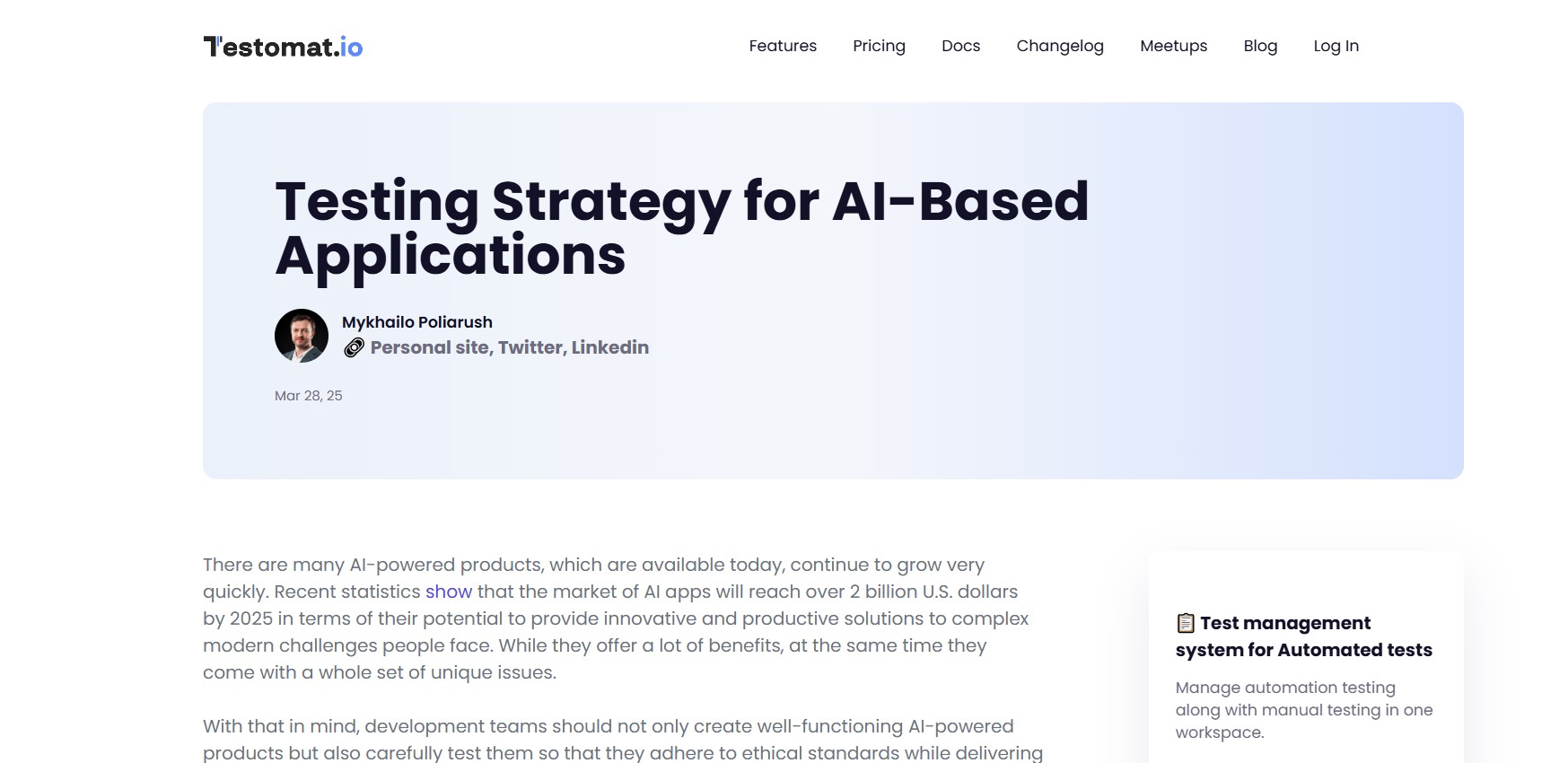Testing AI Applications: A Comprehensive Strategy for Successful Implementation

Strong 8k brings an ultra-HD IPTV experience to your living room and your pocket.
As artificial intelligence (AI) becomes increasingly integrated into software applications, the need for effective testing strategies to ensure functionality, accuracy, and performance has never been more crucial. AI applications, by their nature, present unique challenges that go beyond traditional testing methods. Ensuring that these applications work as expected, perform at scale, and deliver value requires specialized testing approaches. In this article, we explore how to approach testing AI applications effectively, the essential strategies and tools you need, and the best practices for ensuring the reliability and quality of your AI-driven products.
**Understanding the Unique Challenges of Testing AI Applications**
AI applications, unlike standard software applications, rely heavily on data, learning algorithms, and complex models. They are dynamic by design, constantly adapting based on new input, which can make them harder to test than traditional systems. The challenges of testing AI applications can include:
- **Unpredictability**: AI applications may evolve in ways that are not entirely predictable. The behavior of machine learning models can change based on data inputs, which can be challenging to replicate in test environments.
- **Data Dependency**: AI models require large amounts of high-quality data to function correctly. Poor data quality can lead to suboptimal or incorrect outputs, making data validation a critical aspect of testing AI.
- **Bias and Fairness**: AI models are only as good as the data they are trained on. Testing for bias and ensuring fairness are critical components of testing AI applications.
- **Performance and Scalability**: AI models often require significant computational resources, and their performance can vary depending on the scale of the application. Stress testing and load testing are essential to ensure that these applications can handle real-world use cases.
To address these challenges, it’s important to implement a robust **testing AI applications** strategy that incorporates both traditional testing techniques and AI-specific methods.
**The Importance of a Testing Strategy for AI-Based Applications**
A well-thought-out testing strategy is essential for identifying potential flaws early in the development lifecycle. In the case of AI applications, this strategy should include the following key components:
1. **Test Planning and Test Case Design**
The first step in testing AI applications is creating a comprehensive test plan. This plan should outline the objectives, scope, resources, and methodologies for the testing process. When designing test cases, it’s important to consider the AI model's inputs, outputs, performance under different conditions, and how it behaves with various data sets. You’ll want to create tests that account for edge cases and unexpected behaviors that may arise due to the dynamic nature of AI systems.
2. **Data Quality and Validation**
Since AI applications are highly dependent on data, validating the quality of your data is an essential part of the testing process. Data should be checked for accuracy, completeness, consistency, and fairness. Additionally, it's critical to test how well your AI models perform with different sets of data, including noisy, incomplete, or biased data. A robust testing strategy should incorporate automated tools to handle large datasets and ensure the application can process and respond to various data inputs accurately.
3. **Model Evaluation and Performance Testing**
Performance testing for AI applications differs significantly from traditional performance testing. With AI, the emphasis should be on testing the model’s accuracy, speed, scalability, and resource utilization. This includes evaluating how the model performs in real-world conditions, under load, and across varying levels of complexity. You should assess the model's robustness to changes in input data, the system’s responsiveness, and its ability to scale when deployed in a production environment.
4. **Security Testing**
AI applications often involve processing sensitive data, including personal information or proprietary data. As such, security testing becomes critical. You should test for vulnerabilities such as adversarial attacks, data breaches, and model manipulation. Additionally, test the application’s compliance with data protection laws (e.g., GDPR, CCPA) to ensure that user data is securely handled.
5. **Bias and Fairness Testing**
One of the most important aspects of **testing AI applications** is evaluating the model for bias and fairness. Since AI models are trained on data, they can unintentionally perpetuate biases present in the training data. Bias can manifest in various ways, such as favoring one demographic group over another or producing skewed outcomes. As part of your testing strategy, you must ensure that the model is fair and unbiased by running tests that specifically address these concerns. Tools like **Testomat.io** can be used to automate and streamline fairness and bias testing.
6. **Automation of AI Testing**
Due to the complexity of AI applications, manual testing may not be sufficient. Automation is key to improving efficiency and ensuring thorough testing. AI testing tools can automate the testing process by generating test data, running tests at scale, and providing detailed results for evaluation. Automation also helps in regression testing, ensuring that updates to the AI model do not inadvertently affect its performance or behavior.
**Essential Tools for Testing AI Applications**
The right tools can significantly enhance the efficiency and effectiveness of your **testing AI applications** strategy. Here’s a list of the top tools you can use to ensure the quality and reliability of your AI-driven products:
1. **Testomat.io**
Testomat.io is a powerful tool that enables comprehensive test management and automation. It allows you to run tests for both traditional software applications and AI-driven systems, offering features such as test case management, test execution, and reporting. It integrates with other tools in your development pipeline, making it an essential tool for automating AI testing.
2. **TensorFlow Extended (TFX)**
TFX is an end-to-end platform for deploying production ML pipelines. It includes tools for validating models, ensuring data quality, and monitoring model performance. TFX integrates well with other Google Cloud services, making it a popular choice for scaling AI applications.
3. **Apache Kafka**
Kafka is a distributed event streaming platform that can be used for real-time data processing in AI applications. It’s ideal for testing AI systems that need to handle real-time data streams. Kafka helps in ensuring that the AI application can scale effectively and handle large amounts of real-time data efficiently.
4. **Azure Machine Learning**
Azure Machine Learning provides a cloud-based environment for building, testing, and deploying machine learning models. It offers tools for model evaluation, performance testing, and bias detection, which are crucial when **testing AI applications**. It also allows you to automate the model testing process, making it easier to validate AI systems at scale.
5. **Seldon**
Seldon is an open-source platform for deploying, monitoring, and testing machine learning models at scale. It provides a suite of tools for ensuring that AI models function properly in production environments, including model versioning, real-time monitoring, and automated testing.
**Best Practices for Testing AI Applications**
To ensure that your **testing AI applications** process is successful, consider these best practices:
1. **Continuous Testing and Feedback Loops**
AI models are constantly evolving as new data is processed. Continuous testing ensures that changes to the model don’t introduce unexpected behaviors. Implement a continuous integration/continuous deployment (CI/CD) pipeline for AI models to automate testing throughout the development lifecycle.
2. **Collaboration Between Data Scientists and QA Teams**
Testing AI applications requires a collaborative approach between data scientists and quality assurance teams. While data scientists focus on the model’s accuracy and functionality, QA teams can ensure that the system as a whole works as expected in real-world conditions.
3. **Simulate Real-World Scenarios**
When testing AI models, it’s important to simulate real-world scenarios to identify potential issues that could arise during actual usage. Test the AI system’s ability to handle unexpected inputs, varying data quality, and dynamic conditions. The goal is to ensure the model is resilient and can perform well under different circumstances.
4. **Automate Data Validation and Model Monitoring**
AI models can drift over time, meaning their performance can degrade as they are exposed to new data. Automating the validation of new data and monitoring the model’s performance ensures that you can catch issues early and maintain the model’s accuracy and reliability.
**Conclusion: Ensuring the Success of Your AI Applications**
Testing AI applications is a critical step in delivering high-quality, reliable products that meet user expectations and business objectives. By developing a comprehensive **testing AI applications** strategy that includes test planning, data validation, performance evaluation, security testing, and bias detection, you can ensure that your AI systems are robust, fair, and scalable. Utilizing powerful tools like **Testomat.io** and others can streamline the testing process, helping you deliver top-notch AI applications with confidence.
To learn more about testing strategies for AI-based applications, visit [**Testomat.io**](https://testomat.io/blog/testing-strategy-for-ai-based-applications/) and explore their comprehensive approach to AI testing.
Note: IndiBlogHub features both user-submitted and editorial content. We do not verify third-party contributions. Read our Disclaimer and Privacy Policyfor details.


